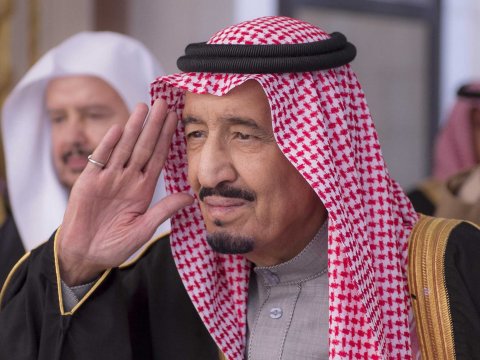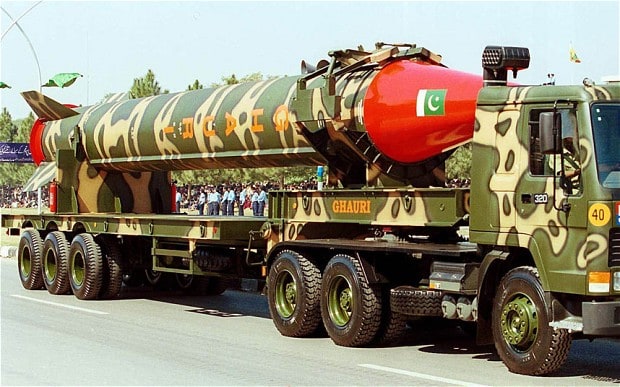هل هناك مايثبت تمويل السعودية للمشروع النووي الباكستاني
Pakistan's involvement[edit]
Main articles:
Pakistan–Saudi Arabia relations and
Science in Pakistan
Historically,
Pakistan and
Saudi Arabia have had extremely cordial relations which sometimes are described as a
special relationship.
[7] Many of Pakistan's political scientists and historians have stated that Saudi interest in nuclear technology began in the 1970s after
Prime Minister Zulfikar Ali Bhuttoconvened a meeting of Pakistan's leading theoretical physicists (who went on to join the
King Fahd University of Petroleum and Minerals), at which Prime Minister Bhutto pointed out advances made in the
Israeli and the
Indian nuclear programme, which he took as attempts to intimidate the
Muslim world, with the
Saudi royal government during a visit by the
Saudi royal family to Pakistan in 1974, as part of the
2nd OIC conference at Lahore.
[7]
It is widely believed that Saudi Arabia has been a major financier of Pakistan's own integrated
atomic bomb project since 1974, a programme founded by former
prime ministerZulfikar Ali Bhutto.
[7][8] In the 1980s, Chief Martial Law Administrator and
President General
Zia-ul-Haq paid a state visit to Saudi Arabia where he unofficially told the King that: "Our achievements are yours".
[7] This cooperation was allegedly furthered by socialist prime minister
Benazir Bhutto in 1995. In 1998, the conservative
Prime minister Nawaz Sharif informed Saudi Arabia confidentially before ordering the nuclear tests (see
Chagai-I and
Chagai-II) in the
Weapon-testing labs-III (WTL) located in the
Chagai remote sitein
Balochistan Province of Pakistan.
[7] In June 1998, the Prime Minister paid a farewell visit to
King Fahd and publicly thanked the Saudi government for supporting the country after the tests.
[7] Shortly thereafter,
Saudi Minister of Defense Prince Sultan went with Prime Minister Sharif on a tour of a classified institute, the
Kahuta Research Laboratories(KRL), where leading scientist
Abdul Qadeer Khan briefed the Prince and Prime Minister Sharif on nuclear physics and sensitive issues involving nuclear explosive devices.
[7]
Since 1998, the
Western's diplomats and intelligence agencies have long believed that an agreement exists in which Pakistan would sell Saudi Arabia nuclear warheads and its own
nuclear technology should security in the
Persian Gulf deteriorate. Both countries have sharply denied the existence of such an agreement.
[8] In 2003, globalsecurity.org reported that Pakistan and Saudi Arabia had entered a secret agreement on nuclear cooperation providing Saudi Arabia with nuclear weapons technology in return for access to cheap
oil for Pakistan.
[9]
In March 2006, the
German magazine
Cicero reported that Saudi Arabia had, since 2003, received assistance from Pakistan to acquire nuclear missiles and warheads. Satellite photos allegedly reveal an underground city with nuclear silos containing
Ghauri rockets in
Al-Sulaiyil, south of the capital
Riyadh.
[10] Pakistan has denied aiding Saudi Arabia in its nuclear ambitions.
[11]
https://en.wikipedia.org/wiki/Nuclear_program_of_Saudi_Arabia
Saudi nuclear weapons 'on order' from Pakistan
Mark UrbanDiplomatic and defence editor, BBC Newsnight
Saudi Arabia has invested in Pakistani nuclear weapons projects, and believes it could obtain atomic bombs at will, a variety of sources have told BBC Newsnight.
http://www.bbc.com/news/world-middle-east-24823846
Saudi Arabia and Pakistan may have just renewed a secret nuclear weapons pact
http://www.businessinsider.com/saudi-arabia-and-pakistans-nuclear-weapons-pact-2015-2
SAUDI ARABIA
IN THIS SECTION:
Nuclear
Last updated: March, 2016
Saudi Arabia possesses only a rudimentary civil nuclear infrastructure, and currently lacks the physical and technological resources to develop an indigenous nuclear weapons capability. Allegations that Saudi Arabia has sought to acquire nuclear weapons in the past have never been substantiated publicly.
Saudi Arabia acceded to the
Treaty on the Nonproliferation of Nuclear Weapons (NPT) as a
non-nuclear weapon state in 1988 and since 1999 has expressed its support for the establishment of a
WMD-free zone in the Middle East. While the last decade has witnessed growing speculation about how Saudi Arabia might respond to Iran’s controversial nuclear program, most experts agree Riyadh remains unlikely to pursue
nuclear weapons for the foreseeable future, even if a nuclear-armed
Iranwere to emerge. In recent years Saudi Arabia has expressed interest in an ambitious agenda to expand its civil nuclear power program, but it remains unclear whether its plans will come to fruition.
History
Saudi Arabia's interest in nuclear-related research dates back to the 1960s, and it has maintained a modest civilian nuclear program since the late 1970s. In 1977, Riyadh established a basic nuclear center known as the King Abd Al-Aziz Center for Science and Technology (KAACST). [1] A decade later, in 1988, the Kingdom established its Atomic Energy Research Institute (AERI) within KAACST, which has conducted research on "industrial applications of
radiation and radioactive
isotopes, nuclear power and reactors, nuclear materials and radiation protection." [2] Since the late 1970s, Saudi scientists have conducted a series of studies into the feasibility of developing
nuclear power plants for electricity generation and desalination purposes, but Saudi Arabia has yet to acquire a
nuclear power reactor. [3]
Proliferation Concerns and Alleged Cooperation with Iraq and Pakistan
Speculation regarding Saudi Arabia's nuclear weapons ambitions has periodically surfaced in the media. According to one report, "among the charges levelled at it have been that it possesses undeclared nuclear facilities; that it sought or may seek a nuclear security guarantee from a country other than the
United Statesin return for energy supplies; and that it has attempted or planned for the outright purchase of a nuclear weapon and/or delivery system from another state." [4]
Most of this speculation stems from allegations made by Muhammad Khilewi, a former Saudi diplomat who defected to the United States in the 1990s. Disclosing thousands of documents he claimed to have copied directly from official Saudi sources, Khilewi asserted that since 1975 Riyadh had sought to acquire nuclear weapons. [5] Khilewi maintained that following the 1973 Arab-Israeli War Saudi Arabia set up a clandestine program run out of the Al-Kharj nuclear research center at a remote military facility near the town of Al-Sulayyil southwest of Riyadh. [6] In a 1998 interview, he also claimed Saudi Arabia had spent millions to support the
Iraqi and
Pakistani nuclear weapons programs. [7] Riyadh has denied the veracity of Khilewi's statements, and most experts dismiss their credibility. [8]
Allegations of Saudi Financial Assistance to Iraq's Nuclear Weapons Program
According to Khilewi's documents, Riyadh provided Saddam Hussein with nearly $5 billion to finance Iraq's clandestine nuclear weapons program between 1975 and 1990. [9] Such funding was allegedly part of Saudi Arabia's broader financial support to Iraq during the Iran-Iraq war, which, according to Khilewi, amounted to $25 billion. [10] In exchange for its financial backing, Saudi Arabia would purportedly receive some of the Iraqi nuclear weapons once they were produced. In addition, Saudi scientists reportedly received nuclear weapons-related training in Iraq as part of the deal. [11] Khilewi claimed the cooperation ultimately collapsed with the Iraqi invasion of Kuwait in 1990.
The Alleged Saudi-Pakistani Nuclear Quid Pro Quo
Allegations that Saudi Arabia provided significant financial support for Pakistan's nuclear weapons program, possibly with the understanding that Islamabad would provide sensitive nuclear weapons-related technology or even extended deterrence in exchange, stem from claims made by Khilewi as well as numerous others. [12] Information in the public domain suggests Riyadh did provide financial assistance to Islamabad in the 1970s and 1980s, along with discounted oil supplies after the United States imposed
sanctions following Pakistan's nuclear tests in 1998. [13] While Saudi aid enabled the program to continue, whether Riyadh directly financed the Pakistani bomb effort or had an explicit nuclear-related agreement with Islamabad remains subject to speculation.
Several high-profile interactions have sparked further suspicions of a Saudi-Pakistani nuclear quid pro quo. In May 1999, Saudi Defense Minister Prince Sultan visited the
uranium enrichment plant and missile facility at Kahuta outside Islamabad, reportedly conducting a follow-up visit in 2002. [14] The notorious Pakistani scientist and black market purveyor of nuclear-related goods and technology, AQ Khan, traveled to Saudi Arabia in November 1999. [15] In October 2003, Crown Prince Abdullah visited Pakistan, a trip which an Israeli senior intelligence official reportedly told the Knesset Foreign Affairs and Defense Committee was intended to secure an agreement whereby Saudi Arabia would purchase Pakistani nuclear warheads to be placed atop Saudi missiles in the event Iran acquired nuclear weapons. [16] Others have speculated such an agreement might involve the stationing of Pakistani nuclear weapons on Saudi territory. [17] Both Riyadh and Islamabad have denied these allegations, and most analysts believe it highly unlikely Pakistan would ever follow through with such an agreement, were it to even exist, given a host of disincentives. [18]
http://www.nti.org/learn/countries/saudi-arabia/nuclear/
ـــــــــــــــــــــــــــــــــــــــــــــــــــــــــــــــــــــــــــــــــــــــــــ
لدي مصادر أخرى إن أردت رغم أن الويكبيديا إنجليش و ال BBC و مجلة ناسيونال انتريست العسكرية و منظمة حماية العالم من الأسلحة أظنها مصادر موثوقة جدا و قاطعة







